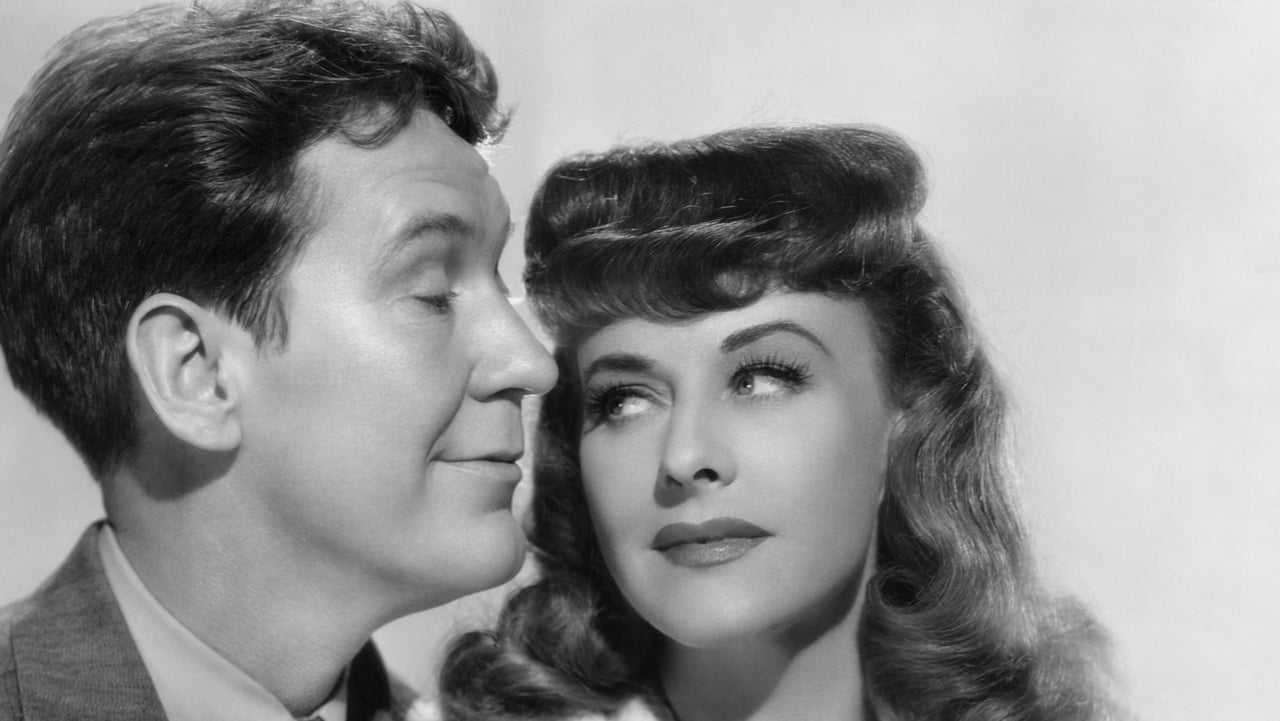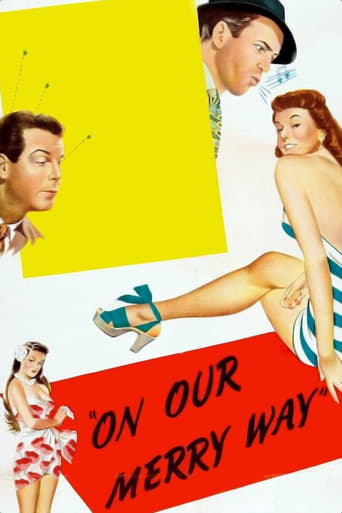Lumsdal
Good , But It Is Overrated By Some
Myron Clemons
A film of deceptively outspoken contemporary relevance, this is cinema at its most alert, alarming and alive.
Scarlet
The film never slows down or bores, plunging from one harrowing sequence to the next.
DKosty123
This movie is done in sequences and cobbled together later which makes it different than most films. It has 4 Directors listed including some top ones and an A-List cast that includes some folks from the silent era as well as some top stars.This has a scene with William Demarest and Fred McMurray which reminded me of all the scenes they do together in MY Three Sons much later. Jimmy Stewart and Henry Fonda in the same film is a rare thing, we have that here. Harry James from the big band era, and a young Burgess Meredith as a reporter.This movie is rich with character actors and the script is written by some top screen writers. So is it perfect? It is an experiment back in this era and because of the cast it is worth a view. Each sequence varies in quality and you will like some of them better than others. At least that is what I did.
zpzjones
Interesting story that doesn't know where it wants to go - I won't be as harsh on this film as other posters. That's perhaps because I know a little about the personal lives of two of it's stars, Burgess Meredith and Paulette Goddard. I just watched this on Kino's DVD. It's one of those rare films with multiple directors and long thought lost. Burgess Meredith and Paulette Goddard get things started for us n the opening and make a cute couple(they were married in real life at the time) and she calls him Oliver, Meredith's real life first name. Meredith plays a newspaper guy and for some reason asks the question "has a child made a difference in your life?" He is IMO trying to get an answer to make something tick for his newspaper article and/or for personal reasons ??. Though this is a scripted film the question, one get's the feeling, is a personal one for Meredith and Goddard, for in real life in 1944 Goddard suffered a miscarriage of their child, probably devastating to both of them. Unless you know that bit of trivia you won't pay but fleeting attention to the conversation between Burgess and Paulette. As stated in the summary this film has to be one of the first motion pictures to show a husband and wife sleeping together in the same bed, which is impressive considering the Breen Production Code in effect at the time. Married couples however would continue to sleep in twin beds until TV shows like The Brady Bunch in the late 1960s. The film pairs off into too many directions first with James Stewart and Henry Fonda, then with Fred MacMurray and William Demarest. Stewart and Fonda were friends in real life and that holds something for fans of the pair but their story is aimless. The duo put on a variety show reminiscent of today's American Idol. MacMurray and Demarest would famously work together again in the mid 60s on My Three Sons, after Demarest replaced William Frawley who became ill and died. MacMurray and Demarest have their comic moments especially with a precocious(in a bad way) little boy called "Sniffles". Demarest is too old for the kind of physical slapstick he's subjected to here. All in all another aimless scene. Dorothy Lamour shows up as a cutie who later dons a sarong in a musical revue. A voluptuous piece of cheesecake, famous for playing the island girl in the Crosby-Hope 'Road' pictures, her stay is all too short. This film should have stayed focused on the interesting beginnings with Meredith and Goddard. Meredith himself is not involved enough in the linking stories to make the finale cohesive. He finds what ever answer/lesson he's looking for but the audience has been shuttled from one minor point to the next. Paulette at the close of the film reveals that she's pregnant(only in the story) and she and Meredith rejoice at end. Their story should have been the main focus of the film and dare the subject of talking about pregnancy which I get at the conclusion that that's what the story was about. Instead we're taken from one inconsequential story to the next without logical tie-in to Meredith and Goddard. That's why I think so many people miss the point and poo-poo the film. But if you know the different junctures of the film especially the part with Burgess Meredith and Paulette Goddard you should be able to enjoy the picture.
MartinHafer
This review is for the version without the Charles Laughton sequence, as this was the one shown by Turner Classic Movies recently.The film stars and was co-produced by Burgess Meredith. Considering that he mostly got supporting roles after this and only a few other producer credits, it is probably safe to assume this film was responsible for this.The film consists of various small films that are tied together by an overall theme. You see, Meredith wants to get a job working as a reporter and each time he interviews someone, their story is dramatized. The question he asks each of the people is "how did a child influence your life?". Surprisingly, the vignettes have various big-name Hollywood stars, such as Jimmy Stewart, Henry Fonda and Dorothy Lamour--perhaps Meredith and his wife/co-star Paulette Goddard got a lot of their friends to be in the film.The first stars Fonda and Stewart. It's about a small-time traveling band that is stranded and puts on a talent show to get the money to get their bus fixed. However, the contest is fixed, as the mayor only let them put on the show if his son (who is a no-talent) is given the award. The film features Alfalfa Switzer (from Our Gang) as the no-talent as well as a surprise cameo at the end by big band leader, Harry James. The film is supposed to be kooky and was an odd waste of the talents of Stewart and Fonda, as the acting and writing were too broad to be taken seriously.The next stars Dorothy Lamour and Victor Moore (an odd combination). They are both struggling actors who have a run-in with a bratty child actor. The kid deliberately ruins their scene they are working for in the film and she thinks this is funny. However, when Moore and Lamour are fired, the kid feels bad and vows to help them with a screen test. The producers love Lamour but are less thrilled about Moore. In the end, however, she hires Moore as her agent. The segment ends with a long dance number. Yes, it did relate to Meredith's question but the style seemed odd and ended very abruptly. Also, the song and dance number seemed out of place.The final segment starred Fred MacMurray and William Demarest (who, you may remember, co-starred together on "My Three Sons" on TV). The film begins with the two being thrown out of town by the cops. The are a couple of grifters in search of some new pigeons (i.e., con-men who want to cheat some unsuspecting people). Oddly, their first potential victim is a little kid with a piggy bank! The kid turns out to be a devilish little prankster, as he makes their lives miserable. In many ways, the story is a lot like a slight reworking of O. Henry's "The Ransom of Red Chief" and the film makers neglected to credit him for the story idea. It is fun watching the kid tormenting the two men but I just wished they'd stuck closer to the original story or just made a film of the O. Henry story--and not all the rest of the vignettes.In the end, Meredith writes his human interest story and goes to see the editor--at which point, the response is not at all what Meredith had expected! But it all works out fine in the end.Overall, not a terrible idea for a film but the film never worked because the first two stories didn't work out well. The biggest negative is bad writing and the only good part was stolen from a famous writer (William Sydney Porter, also known as O. Henry). It's a curious film and is watchable but don't expect it to be much more than a time-passer.
MARIO GAUCI
This odd, freewheeling, independently-made compendium film emerges as little more than a glorified home movie (despite the considerable talent involved) but is certainly watchable and entertaining in itself. The linking narrative revolves around married couple Burgess Meredith and Paulette Goddard (at the time hitched in real life): she's an artist and he a lowly employee with a newspaper aspiring to be a journalist; while attempting to flee a creditor, he meets and interviews a number of people about the influence of children in their lives.The three 'stories' are quite nice with all the various performers contributing generous and relaxed cameos: the first concerns down-and-out musicians Henry Fonda and James Stewart and their involvement in an instrumental contest taking place in a small town (they're all too ready to appease the mayor who has promised them a lot of money if his son is allowed to win but, thanks to the intervention of trumpeter Harry James, a multi-talented girl emerges the clear winner and eventually becomes the owner of Fonda and Stewart's band!); the second finds Dorothy Lamour parodying her former image of a sarong girl (she's a bit player whose opportunity for stardom finally arises out of a disastrous stint in a vehicle for a spoilt child star); the last story, reminiscent of O. Henry's "The Ransom Of Red Chief" (later filmed by Howard Hawks), involves ex-con magician Fred MacMurray and how he and his partner William Demarest stumble upon a boy in the woods and are continually outwitted by him (he's actually fleeing from his eccentric banker uncle but MacMurray eventually discovers his true identity and, in the end, the boy and his elder sister join in on the magic act).


